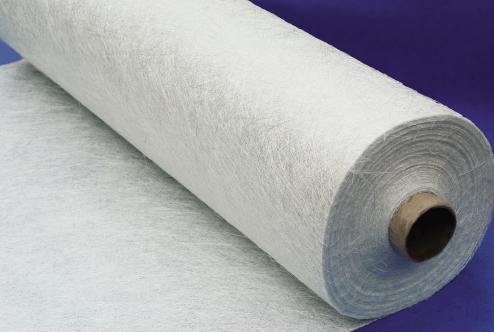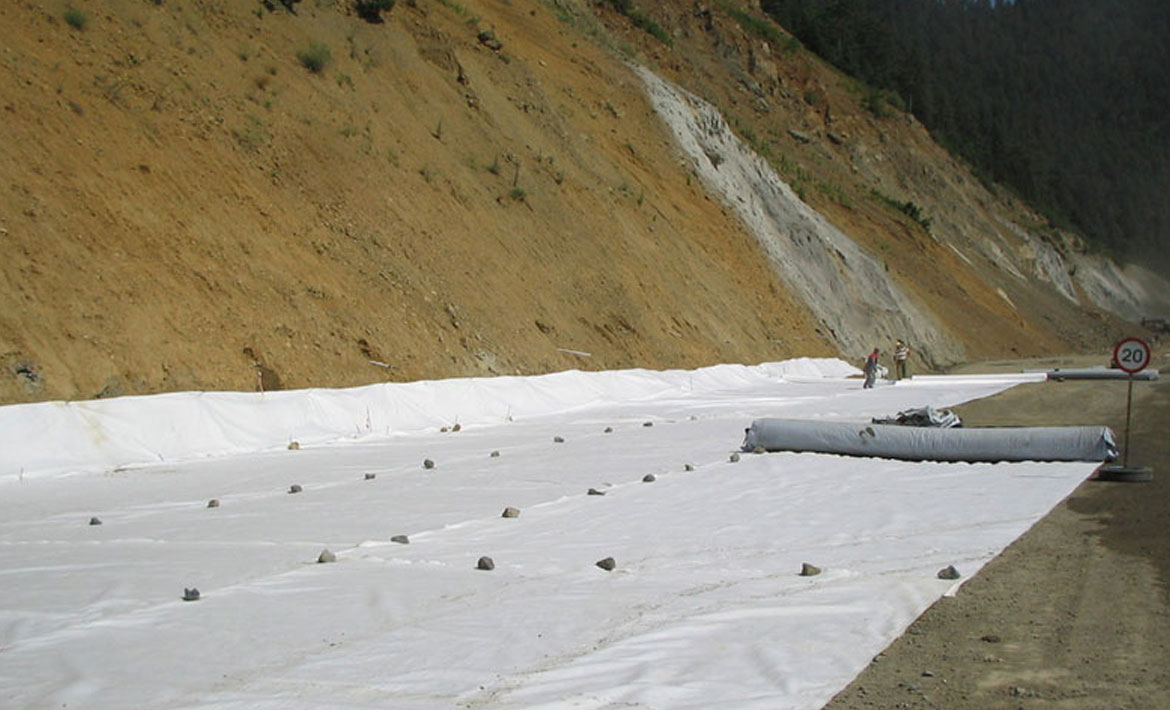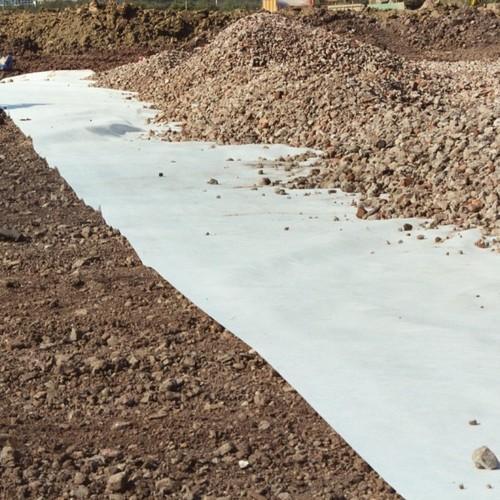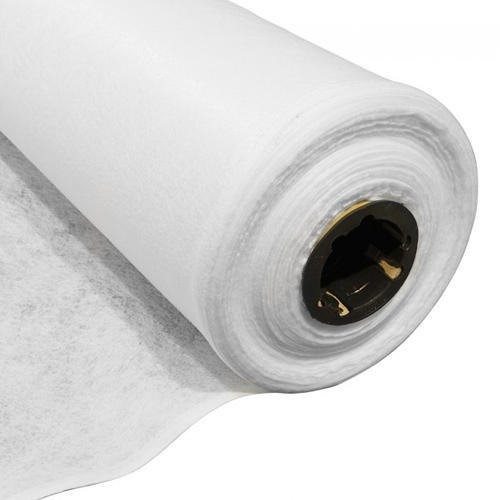Non Woven Geotextile
Non Woven Geotextile
Non-woven geotextile fabric manufacturing is a contemporary process, typically found in the technologically advanced industry that witnesses extrusion of synthetic polymer fibers or filaments, which are then laid onto a moving belt. There are different ways through which these fibers are entangled such as the creation of a durable, non-woven material, needle punching, etc. These are utilized in projects related to civil engineering and construction.
Key Features of Non-Woven Geotextiles:
Standard geotext non-woven textiles help to improve the performance of granular levels. They also enhance the longevity of granular layers because they facilitate the separation as well as filtration functions. These are typically utilized to stabilize ground between subgrade and sub-base layers. This is also around drainage materials.
Non-Woven Geotextiles Manufacturer and Supplier
Deesawala Rubber Industries is a top-notch manufacturer and supplier of non-woven geotextiles. Our products have been made from polyester or polypropylene fibers. They are durable and stable because they have been thermally and mechanically bonded together. Non-woven geotextiles play an important role in improving soil stability, filtration, drainage efficiency and also separation in different environmental as well as construction projects.
Applications of Non-Woven Geotextiles
Non-woven geotextiles are used to provide reliable protection, separation and filtration in various applications related to roads, civil engineering, railways and also environmental projects. We use consistent filaments during our perfectly curated manufacturing process to ensure we create high-quality materials.
Functions and Uses:
- Filtration: It enables the water to pass through. Filtration can prevent the movements of fine oil particles. It is used in drainage systems, erosion control, etc.
- Separation: This is to maintain the integrity of different soil as well as aggregate layers. It ensures structural stability.
- Drainage: It facilitates water flow by providing pathways in applications like landfills, road construction, sports fields, etc.
- Reinforcement: It strengthens oil to support heavy loads. The purpose is also to stabilize slopes, embankments and retaining walls.
Physical Properties of Non-Woven Geotextiles:
- Weight: Our products are available in various weights typically ranging from 100 to 400 grams per square meter (gsm). The weight affects how strong and durable non-woven geotextile is.
- Thickness: Non-woven geotextile’s thickness ranges from 0.5 to 10 millimeters (mm).
- Permeability: The products have been designed to allow water to pass through while retaining soil particles. This is crucial to achieve and maintain drainage efficiency.
- Strength: Non-geo textiles are equipped with good tensile strength and puncture resistance. These two elements are crucial for reinforcement applications.
- UV Resistance: Some variants are UV stabilized for prolonged exposure to sunlight.
Standards and Testing:
Non-woven geotextiles undergo rigorous testing according to ISO and ASTM standards. The testing aims at evaluating their performance under different conditions. Tests include tensile strength, elongation, puncture resistance, and permeability.




Installation of Non-Woven Geotextiles:
These geotextiles are typically installed by placing them directly on prepared soil surfaces or between diverse soil layers. The actual placement is determined after studying application. They are fastened using pins, staples, or by overlaying with soil or aggregates.
Specifications of Non-Woven Geotextiles:
Specifications may vary based on application and product type, including material composition (polyester or polypropylene), weight, thickness, permeability, tensile strength, and roll dimensions.
Material Composition:
Non-woven geotextiles are made from synthetic fibers like polyester (PET) or polypropylene (PP). These fibers are bonded together mechanically or thermally to create a stable as well as durable fabric.
- Thickness:Non-woven geotextiles greatly vary in thickness too. Their thickness is usually measured in millimeters (mm). The options may range from 0.5 mm, 1 mm, 2 mm, with thicker geotextiles, which offer the improved puncture resistance and strength.
- Weight:The products come in various weights. The weights are typically measured in grams per square meter (gsm) or ounces per square yard (osy). Common options include 100 gsm, 150 gsm, 200 gsm. The options clearly indicate higher strength with heavier weights.
- Permeability:Geotextiles have specific permeability characteristics. These attributes define their capacity to permit the passage of water. Permeability is measured in hydraulic conductivity. It is expressed in liters per square meter per second (L/m²/s).
- Tensile Strength:Tensile strength helps to measure a geotextile's resistance to pulling forces. It is generally expressed in kilonewtons per meter (kN/m) or pounds-force per foot (lbf/ft).
- Puncture Resistance:Puncture resistance indicates how well a geotextile can withstand puncturing or penetration by sharp objects. It is quantified in units of Newtons (N) or pounds of force (lbf). It thus reflects the actual force needed to puncture the material.
- Roll Dimensions:Non-woven geotextiles are supplied in rolls with different dimensions. Roll widths range from 1 to 6 meters (3 to 20 feet), and lengths typically vary from 50 to 100 meters (150 to 300 feet).
Non-Woven Needle Punch Fabric:
Deesawala's non-woven needle-punched geotextile fabric consists of continuous filament polyester, designed to provide stress relief and waterproofing. It also reduces a reflecting cracking in paved roads. We test every product rigorously to make sure it delivers optimal performance even in severe weather conditions. The product should be able to maintain stability even under hot bitumen applications.
Applications:
Non-woven geotextiles are used as filtration layers in dykes, river canals, seacoasts, concrete slopes, and retaining walls. They help to prevent clay granules from passing. However, they allow water and gases to permeate freely.
The team Deesalwala Rubbers is more than eager to assist you with your queries, requirements and concern. Reach out!
| Non Woven Geotextile Specification: | Non Woven Geotextile Application: |
| Unmatched finish as per the international standards | Paved and unpaved Roadways. |
| Strong and durable due to online calendaring. | Flood control. |
| Quality Tested products. | Landfills. |
| Tunnels. | |
| Landscaping. | |
| Construction works. |
| Product Grade | SG 120 | SG 120 | SG 120 | SG 120 | SG 120 |
| Unmatched finish as per the international standards | 2 | 2 | 2 | 2 | 2 |
| Roll Width*(m) | 100 | 100 | 100 | 50 | 50 |
| Roll Length(m) | 55 | 90 | 135 | 90 | 112 |
Frequently Asked Questions
Frequent Searches Leading to this page: non woven geotextile, woven and non woven geotextile, geotex non woven, woven non woven geotextile, woven geotextile, non woven geotextile fabric.
